Kidney Insufficiency in Cats
But how do you recognize kidney insufficiency in your cat? What should you pay attention to? And when should you start feeding special kidney food for this condition? These and other questions are answered in the following article.
SOS - When Your Cat Suffers from Kidney Insufficiency
Kidney insufficiency in cats should not be underestimated. You may have already read about it. But when your own cat suffers from acute or chronic kidney insufficiency, it’s a completely different story. Rational thoughts are often swept away by emotions. Worry and despair rise. Let’s start with the basics:
The Function of Healthy Kidneys in Cats
Your cat naturally has two kidneys that perform various functions. A major task of the kidneys is filtering toxins and waste products, which are then excreted through urine. Have you noticed that your cat's urine has a strong smell? If so, you should keep a close eye on your furry friend.
Additionally, your cat's kidneys have a regulatory function. Electrolytes and water balance depend on kidney function. Furthermore, the kidneys play an important role in producing hemoglobin (red blood pigment) and a hormone that regulates blood pressure.
As you can see, the kidneys play an essential role in your cat's small body. If kidney function decreases, it can have far-reaching consequences. Toxic substances may accumulate in your cat’s body, negatively affecting other organs such as the liver and heart. The astonishing and concerning fact about kidney insufficiency in cats is that symptoms often remain hidden for a long time. Symptoms only appear when the kidneys have lost around 60–70% of their function.
How Does CKD Develop in Cats?
The so-called CKD (Chronic Kidney Disease) is a condition that often affects cats. This is largely due to the fact that cats typically don’t drink much. As your cat ages, the risk of kidney insufficiency increases. It is estimated that around 50% of cats over 12 years old suffer from kidney insufficiency. There are numerous triggers and causes of kidney insufficiency in cats:
- Kidney inflammation
- Cystic kidneys
- Cancers
- Leukemia infection
- Kidney stones
- High blood pressure
- Accidents and injuries
- Use of certain medications
When a specific part of the kidney is damaged, the kidney initially compensates. The healthy parts take over the function of the damaged parts, allowing the disease to go unnoticed for a long time. This compensation works well for many years. However, the tissue becomes increasingly damaged due to the additional strain. Over time, the cat loses kidney function, leading to kidney insufficiency. If left untreated, this can result in kidney failure.
Recognizing Kidney Insufficiency in Cats
There are two types of kidney insufficiency in cats: acute and chronic. In acute cases, kidney function rapidly declines. In chronic insufficiency, symptoms and problems develop slowly over a longer period. Unfortunately, both forms are incurable and require urgent treatment. If left untreated, kidney insufficiency can lead to the cat's death.
Unfortunately, symptoms often only appear when CKD is already advanced.
At the same time, symptoms can be very unspecific and may also indicate other illnesses, making diagnosis difficult. When more than 60% of kidney function is lost, the following symptoms may appear, triggering alarm bells:
- Your cat loses weight
- The cat seems lethargic and tired
- Drinking and urinating increase significantly
- Your cat loses interest in eating
- Vomiting and nausea may occur
- Increased itching is noticeable
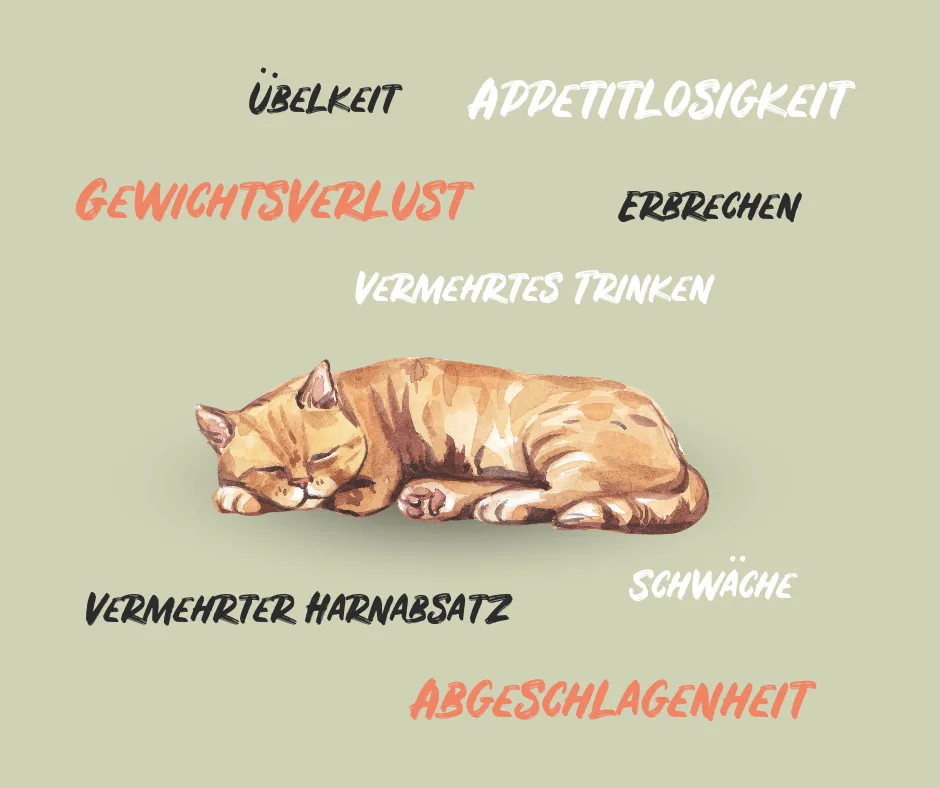
Symptoms of Kidney Insufficiency
If you notice these symptoms, you should immediately take your cat to a veterinarian for targeted examinations:
- Refusal to eat
- Significant weight loss despite food intake
- Dull coat
- Frequent infections
- Persistent vomiting
- Scaly coat
- Fragile bones
- Changes in urination with dark urine
There are also other signs that warrant a timely visit to the vet:
- Your cat approaches the food bowl but turns away without eating.
- A strong odor emanates from the mouth.
- The cat's teeth become loose.
- The mucous membranes appear pale due to impaired circulation.
The veterinarian should conduct various tests. The following findings are commonly observed:
- Changes in the kidneys
- Heart rhythm disturbances
- Protein in urine
- Accumulation of urea in the blood
- Electrolyte imbalances in the blood
- SDMA increases
- Changes in bone structure
Progression of Kidney Insufficiency in Cats
Once kidney insufficiency is diagnosed in your cat, the veterinarian assigns it to a specific stage. These stages are medical guidelines that help the vet tailor the treatment plan. The severity of kidney insufficiency significantly impacts the approach to treatment. Generally, there are four different stages, ranging from mild to severe impairments. The vet evaluates the severity based on the following criteria:
- The concentration of waste products in the blood increases over time.
- Your cat's blood pressure is elevated.
- Protein is excreted through the kidneys and can be detected in the urine.
- Frequent occurrence of typical kidney insufficiency symptoms.
Stages of Kidney Insufficiency in Cats
Kidney insufficiency in cats is a gradual process that develops over time. It is categorized into different stages:
Stage 1: No visible symptoms
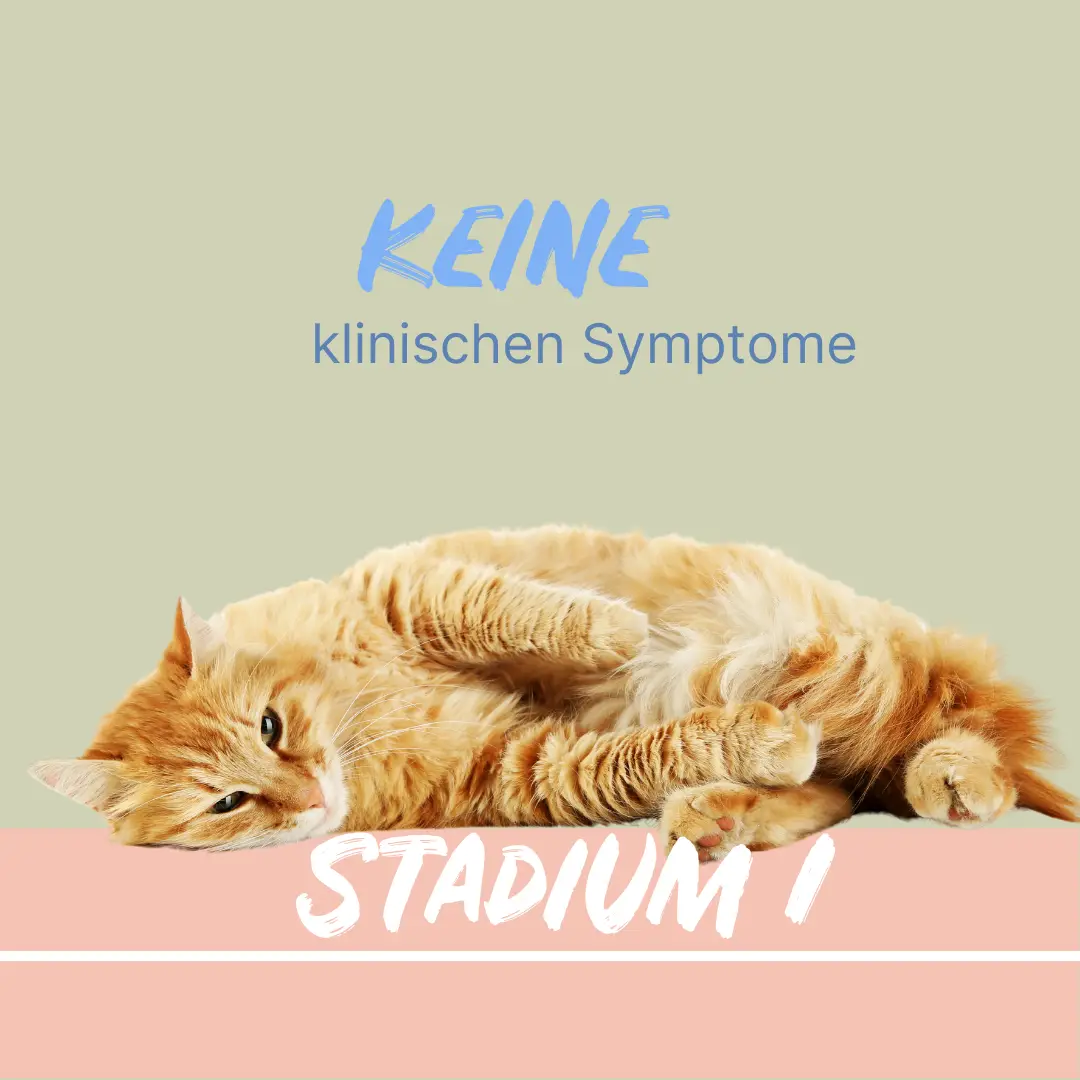
The early stage of kidney insufficiency. No external symptoms or clinical signs are visible. Creatinine levels and protein-creatinine ratio remain normal. No impact on life expectancy at this stage.
Stage 2: Mild signs
Some symptoms may appear, such as increased drinking or urination. SDMA and creatinine levels are slightly elevated but might still be in the normal range. Life expectancy at this stage can reach up to three years if detected early.
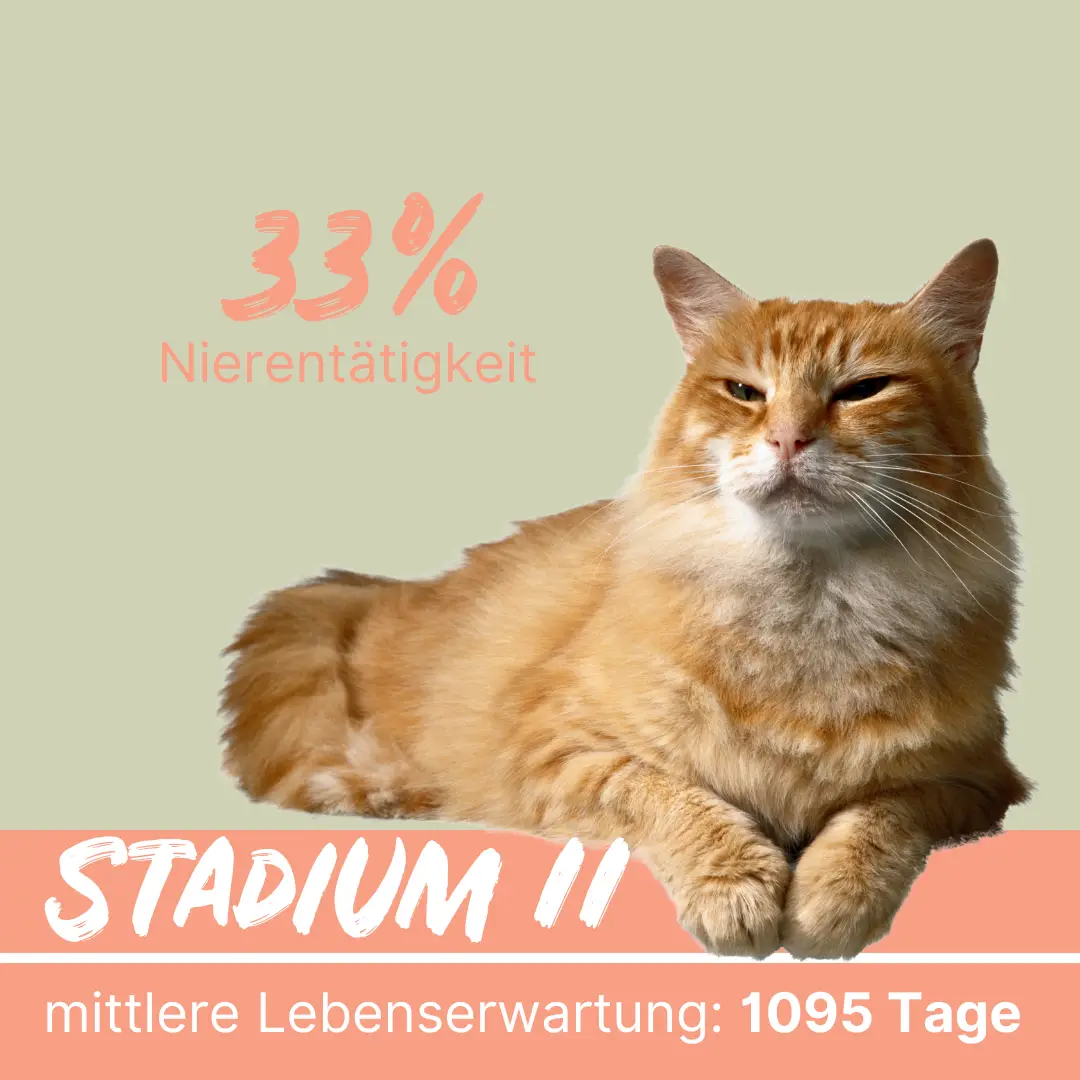
Stage 3: Uremic kidney failure
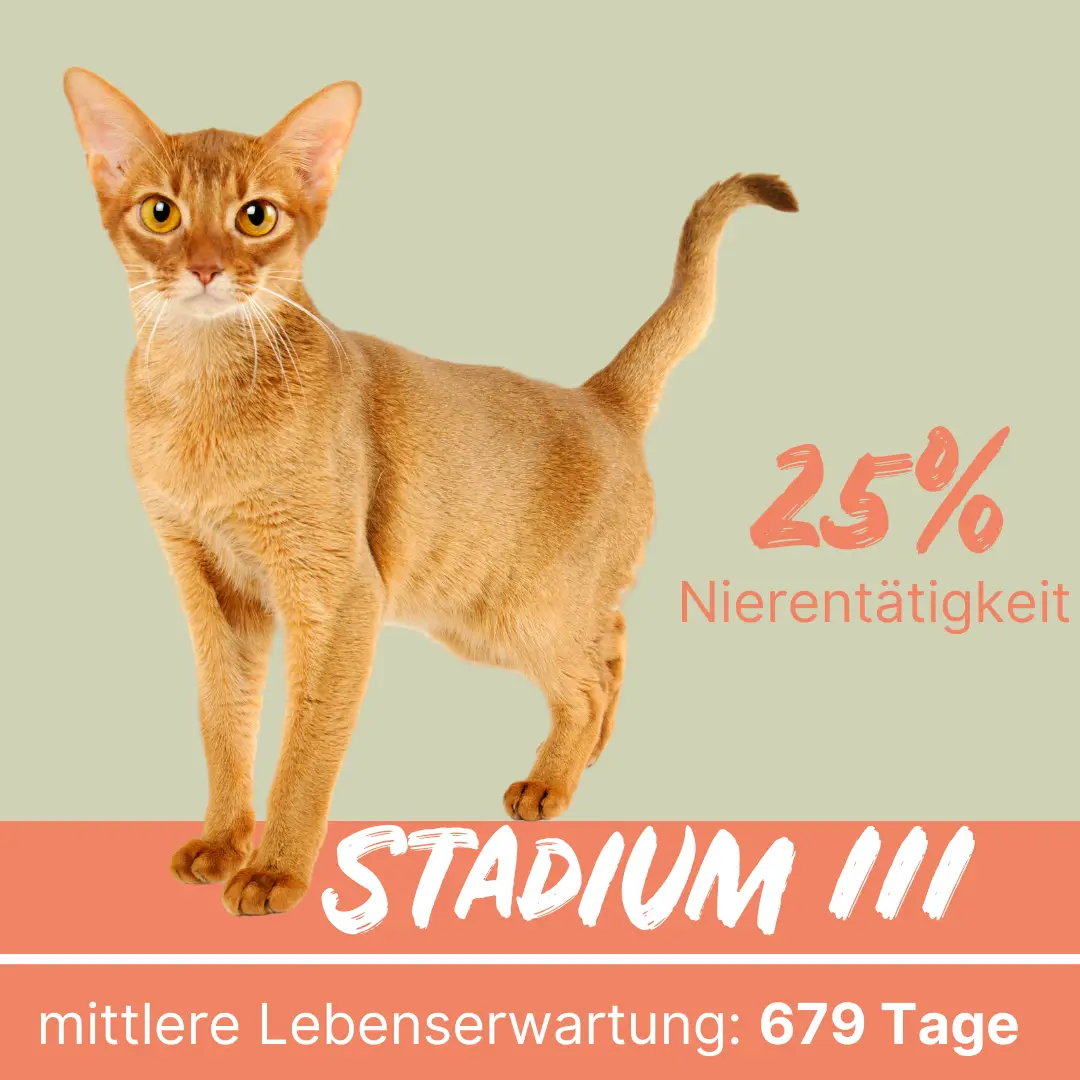
Severe symptoms such as dull coat, vomiting, loss of appetite, and weight loss are present. Creatinine levels are moderately above normal, and 75% of kidney tissue is irreparably damaged. Without treatment, life expectancy is around two years.
Stage 4: End-stage kidney failure
Symptoms are severe, including persistent vomiting, refusal to eat, dehydration, and weakness. Life expectancy without treatment is approximately 35 days.
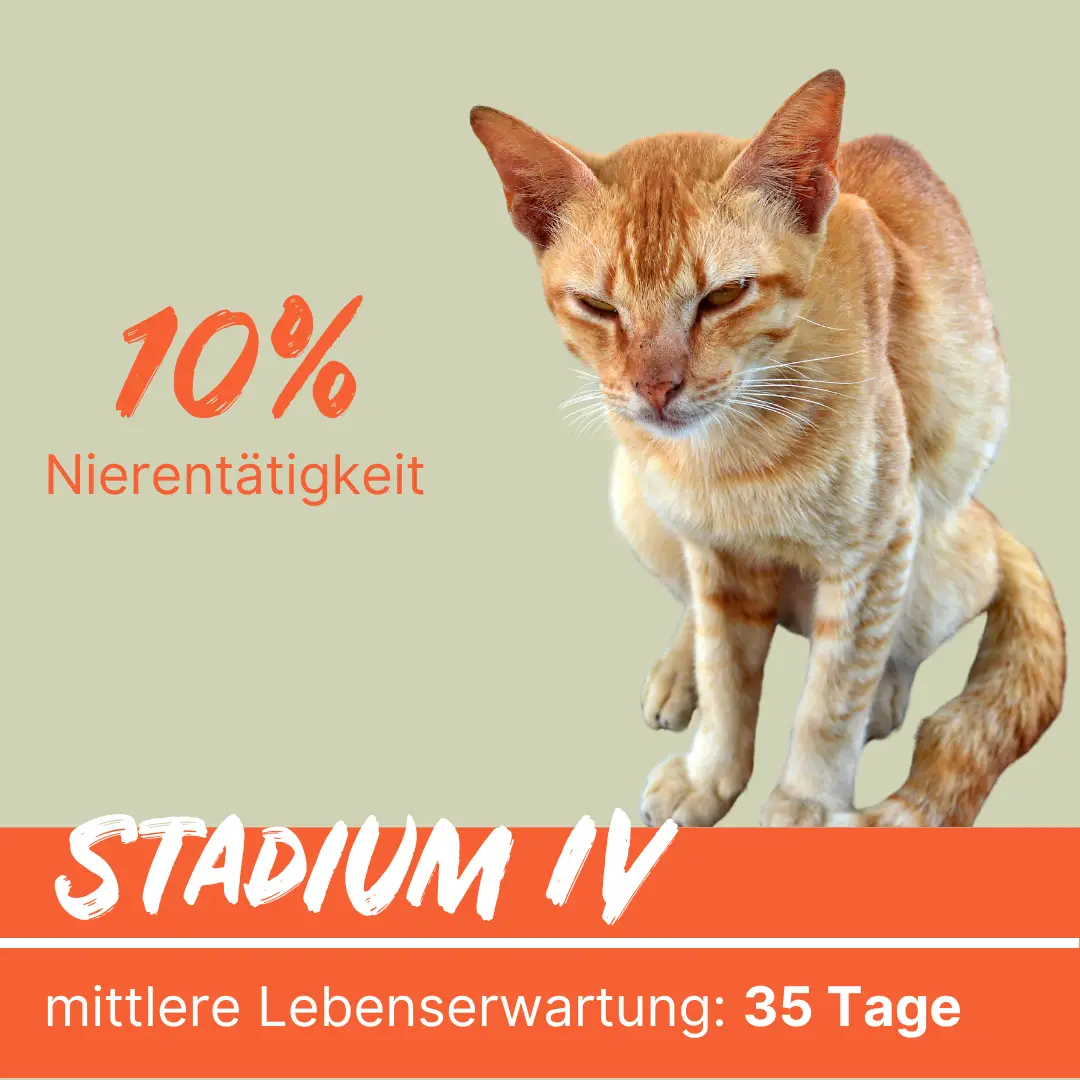
Chronic Kidney Insufficiency
Chronic kidney insufficiency is an age-related condition that results from long-term overloading of kidney tissue. This leads to kidney tissue destruction and reduced organ function. Early detection can extend life expectancy, but the progressive nature of the disease cannot be halted.
A special kidney diet may become necessary from Stage II onwards—consult your vet for guidance. Over time, phosphate binders might also be needed, but only with professional advice.
Early detection, proper treatment, and diet adjustment are crucial in managing kidney insufficiency.
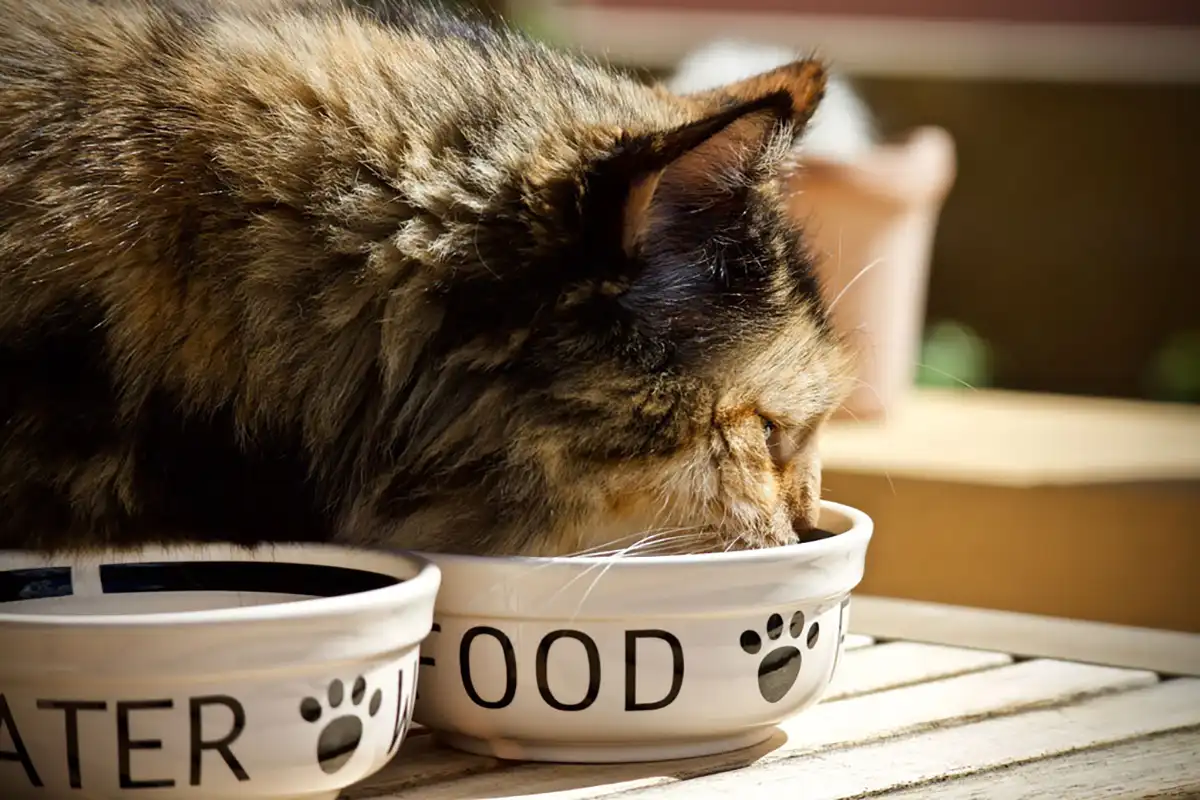
Why Is Kidney Insufficiency Dangerous for Cats?
Kidney insufficiency in cats can become a life-threatening condition. Here are some critical points to consider:
- If waste substances are no longer filtered by the kidneys, their concentration in the cat's blood increases. Over time, this can lead to poisoning of all organs, with the brain being particularly affected.
- High blood pressure can have long-term effects on your cat's organs and eyes, with the brain and heart being especially at risk.
- If your cat urinates frequently, it loses essential electrolytes. This creates a vicious cycle, as the electrolyte imbalance causes increased vomiting. This can lead to circulatory issues, undernourishment of organs, and a worsening of kidney insufficiency in cats.
Life Expectancy of Cats with Kidney Insufficiency
Many cat owners want their vet to tell them how long their feline companion might live after being diagnosed. However, there is no definitive answer. Various factors play a role, including the treatment plan and dietary adjustments. If kidney insufficiency in cats is detected at an early stage, the prognosis is better. By addressing symptoms individually and consistently, life expectancy can be extended. The individual organism of your cat also determines how well it copes with the condition. With early detection, proper treatment, and a high-quality diet adjustment, cats often live for several more years.
Treatment of Kidney Insufficiency
Kidney insufficiency in cats is an incurable disease. Most cats over 12 years old suffer from this condition. While kidney insufficiency in cats is irreversible, its progression can be slowed with proper symptomatic treatment and dietary changes. This helps reduce the progression of the disease and improve your cat's quality of life.
Alongside medication prescribed by a veterinarian, you can also help your cat in two significant ways:
- Ensure that your cat eats enough food and drinks plenty of water. Monitoring food and water intake is crucial, although it can be challenging with outdoor cats.
- A gentle diet can relieve the burden on your cat's kidneys, reducing the workload on damaged tissue. A kidney-friendly diet should include high-quality products like BARF.
Sometimes symptoms become more pronounced. However, with the right treatment, your cat can often stabilize. Treatment for kidney insufficiency in cats depends on its stage and severity and typically involves the following key measures:
01.
The Diet
Your cat should be fed a special kidney diet. This food has reduced protein content, leading to fewer waste substances. To be effective, the kidney diet should be introduced at an early stage (from Stage 2).
02.
Fluid Intake
If your cat suffers from kidney insufficiency, ensure it drinks enough fresh water. "Meat water" can be added to regular water as an incentive for increased fluid intake.
03.
Medications
Medication is prescribed based on symptoms and blood values. Regular check-ups for your cat are crucial to adjust the treatment plan as needed.
Diet Recommendations for Cats with Kidney Insufficiency
As with all health-related issues, diet plays a crucial role in kidney insufficiency. What your cat eats significantly impacts its organ function and health. Proper nutrition lays the foundation for a healthy body—for both humans and pets alike.
Some veterinarians recommend special kidney diets, often in the form of dry food. However, due to its low moisture content, dry food can negatively impact the kidneys. It is better to offer your cat high-quality fresh meat that contains easily digestible vitamins and minerals without unnecessary chemical additives and with high moisture content.
Specifically for cats with kidney insufficiency, eBarf offers renal complete menus. These were developed with animal health practitioner and feline nutrition expert Petra von Quillfeldt and are tailored to the needs of cats with kidney issues. Alongside fresh muscle meat from turkey, chicken, and beef, high-quality organ meats and other natural supplements ensure optimal nutrition for your cat.
Poultry is particularly high-quality and easily digestible protein. As natural prey for cats, poultry is generally well-accepted, especially important for cats suffering from nausea and vomiting. Appetite is crucial for cats with kidney issues.
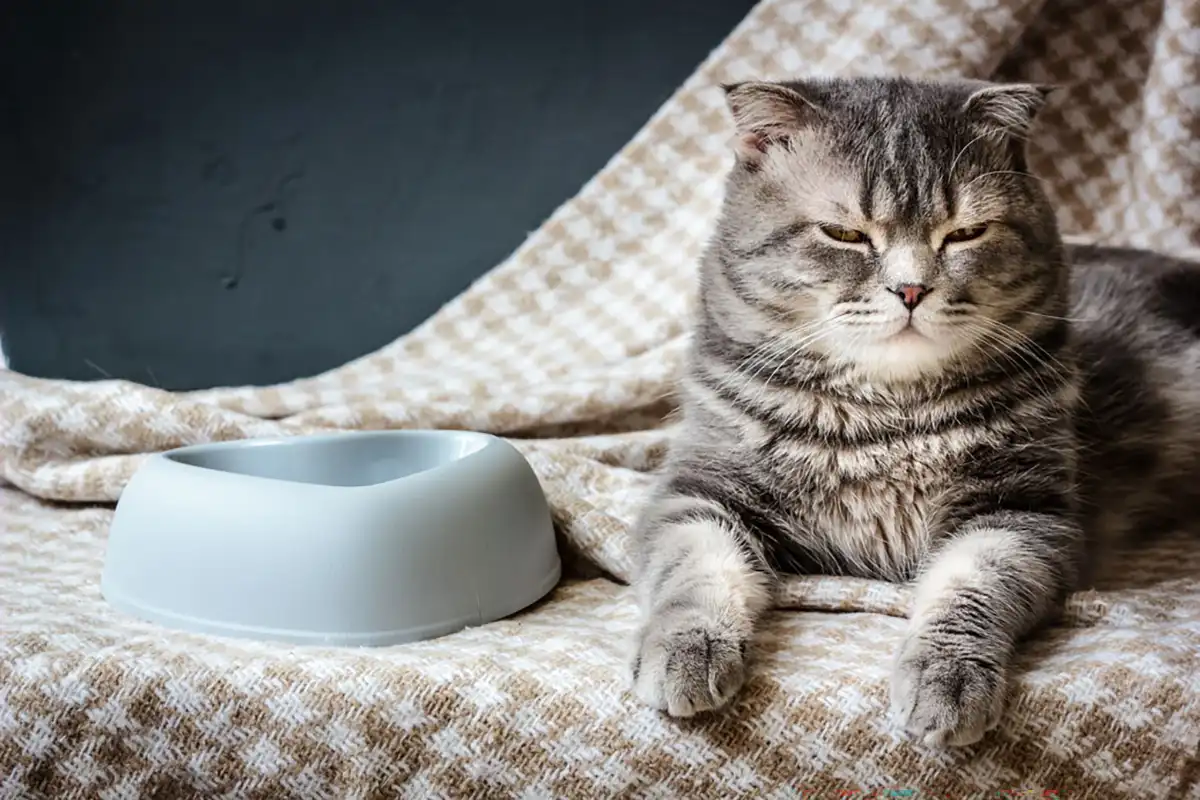
The Unique Features of Fix-BARF® Renal Complete Menus from eBarf
- Unlike conventional kidney diets, Fix-BARF® renal is completely grain-free and contains no carbohydrates—aside from necessary fiber (which cannot be digested by a cat's body in its raw state) and pectin (a binding agent derived from ripe apples that inhibits the production of ammonia and urea in the large intestine).
- The renal complete menus are free of other plant-based components or additives. The fiber content is increased to 10%, using pumpkin, which soothes and supports digestive function, helping to prevent common gastrointestinal issues in cats with kidney disease. Since cats are typically prone to constipation, pumpkin is generally well-tolerated.
- The phosphorus content in the menus is significantly reduced (by about 30% of the required value to 170 mg/MJ ME (megajoule metabolizable energy)), thus easing the burden on the kidneys.
- The calcium content is calculated to maintain a favorable Ca/P (calcium/phosphorus) ratio of 1.4/1, despite the significant reduction in phosphorus.
- The iron requirement for cats with chronic kidney disease is typically higher than for healthy cats. Anemia often develops during the disease, so the iron intake in the kidney diet recipes has been increased by 150%.
- To achieve a slightly reduced sodium content while maintaining a stable potassium/sodium ratio, the potassium content was not increased, but the sodium content was adjusted, resulting in a ratio of Ka/Na of 1.9 to 2.1/1.
- The protein content meets the nutritional requirement (and is therefore not too high). Fix-BARF® renal menus are calculated at approximately 15 g digestible crude protein per MJ ME. Prepared with high-quality, highly digestible muscle meat and containing only animal products (aside from fiber and pectin), this food has excellent acceptance among cats.
- No connective tissue-rich meats, such as neck meat, gullet meat, stomachs, tendons, cartilage, or other harder-to-digest components, are used. By exclusively using high-quality animal protein, the amount of nitrogen compounds in the intestines is limited. Additionally, the amount of ammonia produced by bacterial breakdown in the colon is minimized, and fermentable pectin further inhibits the formation of ammonia and urea.
- Kidney disease causes the body to flush out water-soluble vitamins. Therefore, cats require more B vitamins, biotin, and folic acid. This increased need has been accounted for in the recipes.
- To counteract polyuria (increased urination) in cats with kidney disease, Fix-BARF® renal menus can be mixed with about 30 ml of warm water before feeding. Many cats love this warm "soup."
- The energy content in the kidney complete menus is increased by additional fat, without increasing the total energy content of the portion. This includes an increased requirement for vitamin E (antioxidant) and a reduced amount of protein and phosphate. The menus contain 50% more vitamin E than required. The higher fat content in the recipe also increases acceptance, as cats are fat-loving carnivores.
- To achieve a phosphate content below the required level, egg whites are used in the special kidney menus. Egg whites provide highly digestible protein without phosphate. Raw egg white contains a protein that inhibits the absorption of biotin, an essential vitamin for cats. Therefore, the egg whites are cooked before being added to the menu.
- The proportion of salmon oil in the renal complete menus is 2 g per kg of food. The oil contains essential omega-3 fatty acids that support your cat's overall health.
Special Notes on Kidney-Specific Diets for Cats
As a rule, you should only feed a kidney-specific diet to your cat with chronic kidney disease upon the advice of your veterinarian following a diagnosis and assessment of the severity of the condition. Additionally, do not feed the kidney diet for more than six months at a time without a follow-up visit to your veterinarian. Cats on a kidney diet should be under regular veterinary supervision.
If your cat has not previously been fed BARF, ensure a gradual transition to the new food to allow its system to adjust. Some cats are very picky eaters, so patience may be required. Stick with the transition, as it is a critical component in treating cats with kidney disease.
If you have questions about the products, you can reach out directly to Petra von Quillfeldt. She is not only the author of "Katzen BARFen" but also the developer of kidney-specific products for cats. She is an expert in this field.





















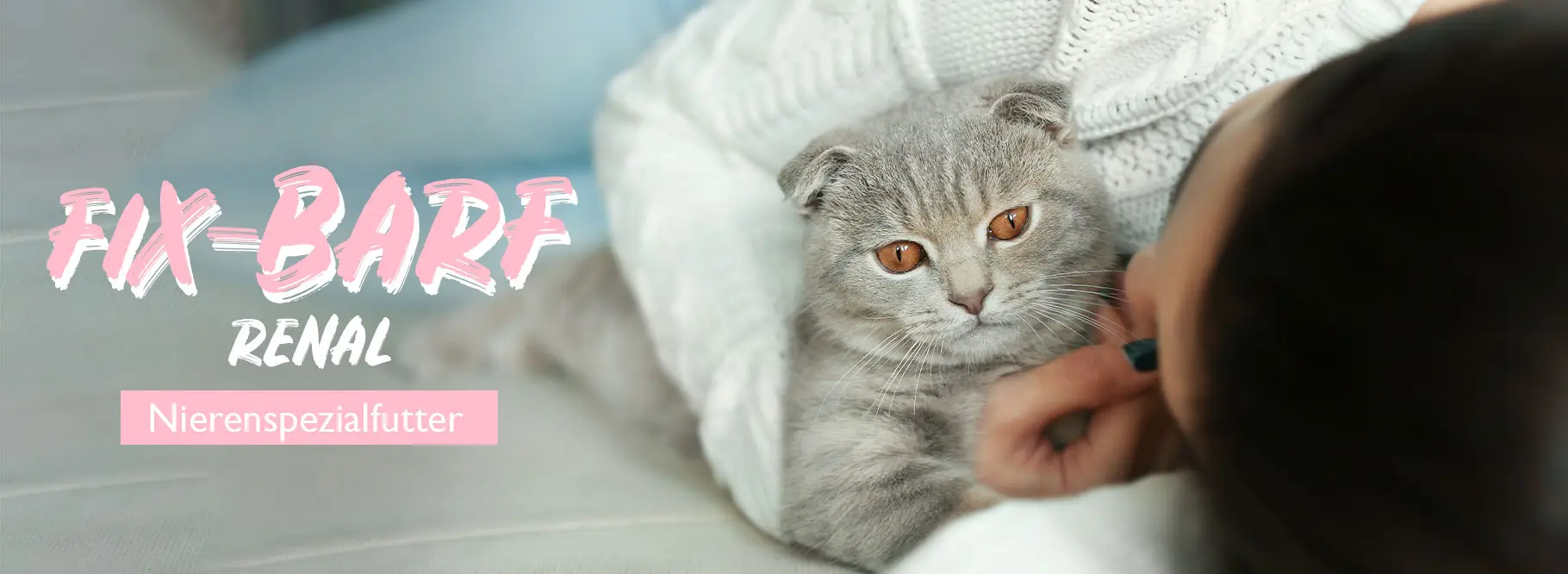
0 Kommentare